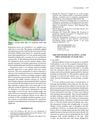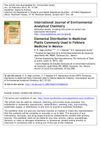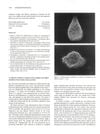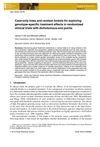 8 citations,
January 2008 in “Pediatric dermatology”
8 citations,
January 2008 in “Pediatric dermatology” Hair gels may cause split ends in children.
 8 citations,
November 2002 in “The Canadian journal of psychiatry/Canadian journal of psychiatry”
8 citations,
November 2002 in “The Canadian journal of psychiatry/Canadian journal of psychiatry” Increasing olanzapine caused hair loss in a woman, which stopped after changing medication.
 8 citations,
February 1997 in “International journal of environmental analytical chemistry”
8 citations,
February 1997 in “International journal of environmental analytical chemistry” Most medicinal plants in Mexican folklore have safe element levels, but arsenic exceeds safe limits in almost all.
 8 citations,
September 1993 in “British journal of dermatology/British journal of dermatology, Supplement”
8 citations,
September 1993 in “British journal of dermatology/British journal of dermatology, Supplement” A new method helps isolate key hair components to study hair growth and loss.
 7 citations,
October 2019 in “Evidence-based Complementary and Alternative Medicine”
7 citations,
October 2019 in “Evidence-based Complementary and Alternative Medicine” Chinese medicine may help hair growth and reduce hair loss in androgenetic alopecia.
 7 citations,
February 2019 in “International Journal of Dermatology”
7 citations,
February 2019 in “International Journal of Dermatology” Gray hair is caused by reduced melanin production or transfer issues, linked to aging and possibly health conditions, with treatments focusing on color camouflage.
 7 citations,
May 2016 in “SpringerPlus”
7 citations,
May 2016 in “SpringerPlus” Some breast cancer patients on hormone therapy experience hair loss, and treatments like certain topical inhibitors and supplements may help without harming their cancer prognosis.
 7 citations,
September 2013 in “Current Dermatology Reports”
7 citations,
September 2013 in “Current Dermatology Reports” Some skin medications are safe for pregnant women, but others pose risks or should not be used.
 7 citations,
December 2008 in “Expert Review of Dermatology”
7 citations,
December 2008 in “Expert Review of Dermatology” The document concludes that various childhood hair and nail disorders exist, some may improve on their own, and advances in genetics and immunology could enhance treatment and counseling.
 7 citations,
July 1999 in “In Practice”
7 citations,
July 1999 in “In Practice” The conclusion is that a systematic approach is key for treating symmetrical alopecia in dogs, but treatment may not always be necessary.
 6 citations,
April 2019 in “Journal of Cosmetic Dermatology”
6 citations,
April 2019 in “Journal of Cosmetic Dermatology” Hair loss affects women's self-esteem; treatments like minoxidil can help.
 6 citations,
January 2018 in “Journal of Cellular Physiology”
6 citations,
January 2018 in “Journal of Cellular Physiology” Human scalp fat stem cells showed improved cartilage-like development on a special scaffold with freeze-thaw treatment.
 6 citations,
October 2017
6 citations,
October 2017 Indian Gooseberry has potential for cancer prevention and treatment and promotes hair growth.
 6 citations,
September 2014 in “Food Additives & Contaminants: Part A”
6 citations,
September 2014 in “Food Additives & Contaminants: Part A” New method effectively detects illegal hormones in anti-aging foods.
 6 citations,
September 2014 in “Australasian Journal of Dermatology”
6 citations,
September 2014 in “Australasian Journal of Dermatology” Asylum seekers arriving by boat may face skin problems due to harsh conditions, and doctors should use a thorough skin assessment approach to diagnose and treat them effectively.
 6 citations,
January 2011 in “Springer eBooks”
6 citations,
January 2011 in “Springer eBooks” Nutrition is important for skin health, and changing diet can help prevent and treat skin diseases.
 6 citations,
November 2007 in “Archives of Disease in Childhood: Education & Practice”
6 citations,
November 2007 in “Archives of Disease in Childhood: Education & Practice” The document concludes that accurate diagnosis of alopecia in children relies on thorough examination and history, and while treatments exist, none can alter the course of alopecia areata, which can significantly affect a child's psychological well-being.
 6 citations,
March 1999 in “Journal of pediatric health care”
6 citations,
March 1999 in “Journal of pediatric health care” The document emphasizes the need for primary care providers to understand and care for African American children's hair and skin to boost their self-esteem.
 6 citations,
August 1991 in “Pediatric Clinics of North America”
6 citations,
August 1991 in “Pediatric Clinics of North America” The document concludes that various hair and scalp disorders in children have specific treatments and proper diagnosis is essential.
 6 citations,
February 1974 in “The BMJ”
6 citations,
February 1974 in “The BMJ” The document concludes that scalp disorders can be treated with hair washing, specific shampoos, medications, and sometimes surgery or hair transplants, but hereditary baldness is untreatable.
 5 citations,
May 2023 in “Frontiers in immunology”
5 citations,
May 2023 in “Frontiers in immunology” Environmental factors like diet and vitamin levels, especially Vitamin D, can affect autoimmune diseases differently, with lifestyle changes potentially improving outcomes.
 5 citations,
June 2021 in “Pharmacological Reports”
5 citations,
June 2021 in “Pharmacological Reports” Vitamin D may help reduce antibody levels in men with autoimmune thyroiditis and early-onset androgenic alopecia, but has no significant impact on thyroid function.
 5 citations,
May 2020 in “Diagnostics”
5 citations,
May 2020 in “Diagnostics” Lower zinc levels may predict less effective hair loss treatment.
 5 citations,
July 2019 in “Applied statistics/Journal of the Royal Statistical Society. Series C, Applied statistics”
5 citations,
July 2019 in “Applied statistics/Journal of the Royal Statistical Society. Series C, Applied statistics” Case-only trees and random forests improve predictions of treatment effects in clinical trials.
 5 citations,
March 2018 in “Advances in integrative medicine”
5 citations,
March 2018 in “Advances in integrative medicine” A 23-year-old woman with Hashimoto’s thyroiditis improved significantly after a 15-month integrative treatment plan.
 5 citations,
July 2017 in “Women & Health”
5 citations,
July 2017 in “Women & Health” Nursing women in the West Bank with higher income and non-smoking habits have higher blood zinc levels.
 5 citations,
December 2014 in “Polish Journal of Public Health”
5 citations,
December 2014 in “Polish Journal of Public Health” Zinc is essential for many body functions and imbalances can lead to health problems.
 5 citations,
October 2013 in “Veterinary Clinics of North America: Equine Practice”
5 citations,
October 2013 in “Veterinary Clinics of North America: Equine Practice” Some horses lose hair without inflammation or itching due to various conditions, and while mainly a cosmetic issue, diagnosis requires examination and biopsies, and breeding is not advised if it's hereditary.
 5 citations,
December 2011 in “InTech eBooks”
5 citations,
December 2011 in “InTech eBooks” Eat antioxidant-rich foods, reduce fast food, and explore various treatments for vitiligo.
 5 citations,
November 2011 in “Expert Review of Dermatology”
5 citations,
November 2011 in “Expert Review of Dermatology” The document concludes that early diagnosis and a comprehensive treatment plan are crucial for managing hair loss in children, with a focus on both medical and psychological support.






























